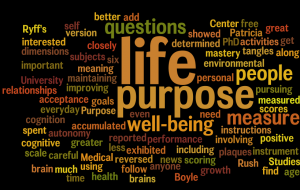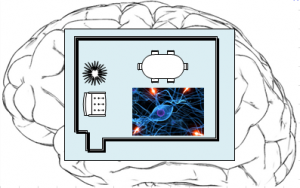Facebook Improves Mental Updating by 25%
An interesting preliminary study from the psychology department at the University of Arizona found that seniors trained to use Facebook showed measurable improvement in their cognitive abilities. More specifically:
“In the follow-ups, those who had learned to use Facebook performed about 25 percent better than they did at the start of the study on tasks designed to measure their mental updating abilities”
Mental updating is the ability to add and delete contents in your working memory. The study included a small group of seniors ages 68-91 with little or no prior Facebook experience. Participants friended only those in their group and made at least one short post daily.
Researchers believe that the constant information updating on Facebook and its relatively complex interface are responsible for the improvement. But more research is needed.
I am interested to hear from readers that use Facebook as a means to boost cognitive performance or maintain brain health.
Categories: Memory and Learning, Mental Focus, Older Adult, Software, Training Tags:
Early Musical Training Boosts Motor Skills
 An interesting finding for parents looking to accelerated their kid’s brain development:
An interesting finding for parents looking to accelerated their kid’s brain development:
“A study published last month in the Journal of Neuroscience suggests that musical training before the age of seven has a significant effect on the development of the brain, showing that those who began early had stronger connections between motor regions – the parts of the brain that help you plan and carry out movements.”
The study found that the effect is strongest between the ages of 6-8 and that there appears to be no effect in adults.
Interested to hear from readers that are using music as part of their Next Brain development efforts.
Categories: Child, Cognitive Development, Music and Audio, Training Tags:
Raising Your Kid’s IQ – What Science Tells Us
 If you were to carefully review the scientific studies of the things parents can do to boost their kids’ IQ what would you find? That is exactly what researchers as the NYU Steinhardt School of Culture, Education, and Human Development did and here is what they found:
If you were to carefully review the scientific studies of the things parents can do to boost their kids’ IQ what would you find? That is exactly what researchers as the NYU Steinhardt School of Culture, Education, and Human Development did and here is what they found:
Overall, the results of the meta-analyses indicated that certain dietary and environmental interventions can be effective in raising children’s IQ.
More specifically:
- Pregnant moms or newborn that eat foods rich in Omega-3 can boost IQ by 3.5 points
- Interactive reading or reading with your child boosts IQ by 6 points if they are 4 years old or less
- Going to preschools that includes a language component boosts IQ by 7 points.
Increases in IQ are approximate but these are meaningful improvements.
The researcher expect to uncover additional insights which I will blog about. In the meantime I am interested to hear from readers about specific ways to boost a kid’s IQ.
Categories: Cognitive Development, Diet, Training Tags:
Reading the Classics Lights Up Your Brain
 Interesting new research from Liverpool University claims that Reading Shakespeare has a Dramatic Effect on the Human Brain. Actually they found that reading any classic literature for example Shakespeare, Wordsworth, Elliot, Bard and others causes far more brain activation than the same content translated into plain language. The classic prose demands attention, occasionally stimulates self reflection and builds more mental muscle because the brain works harder.
Interesting new research from Liverpool University claims that Reading Shakespeare has a Dramatic Effect on the Human Brain. Actually they found that reading any classic literature for example Shakespeare, Wordsworth, Elliot, Bard and others causes far more brain activation than the same content translated into plain language. The classic prose demands attention, occasionally stimulates self reflection and builds more mental muscle because the brain works harder.
How does it work? One insight the researchers offer:
“By throwing odd words into seemingly normal sentences, Shakespeare surprises the brain and catches it off guard in a manner that produces a sudden burst of activity – a sense of drama created out of the simplest of things.”
A bit like a magic trick.
I am interested to hear from readers that enjoy the classics. Does the non-standard use of language stimulate your brain in a positive way?
Categories: Books, Cognitive Development Tags:
Is Turmeric a Super Brain Spice?
 Psychology today has an interesting post on the brain boosting effects of Curry. They claim over 4000 studies of Curry’s health benefits have been conducted over the last 10 years. General findings for brain function and cognitive performance are that Curry containing tumeric can:
Psychology today has an interesting post on the brain boosting effects of Curry. They claim over 4000 studies of Curry’s health benefits have been conducted over the last 10 years. General findings for brain function and cognitive performance are that Curry containing tumeric can:
decrease the risk of dementia, stimulate the grow of new brain cells, increase the production of neurotransmitters that support clear thinking and good moods and is being a strong antioxidant it will reduce inflammation that can harm brain cells.
The key ingredient in Curry that is doing the brain work is the turmeric, a spice you can buy in local your grocery store. The article goes on to suggest other spices to use it with and a recipe to try. For example, using turmeric with black pepper enhances absorption of the spice into your system by 2000%.
I am going to experiment with turmeric and try and find ways to include it in my daily diet. Besides curry-based meals there are for example turmeric teas, eggs, fries and salads to try and even special turmeric or curcumin supplements.
Categories: Cognitive Development, Diet, Mental Focus Tags:
Purpose Boosts Mental Performance & Brain Health
Studies at the Rush University Medical Center involving over 1000 subjects:
“…showed that people who reported greater purpose in life exhibited better cognition than those with less purpose in life even as plaques and tangles accumulated in their brains,” said Patricia A. Boyle, PhD.”
This is great news for anyone interested in improving cognitive performance or maintaining brain health as they age.
 Purpose in life is determined by the meaning you get from everyday activities and how much of your time is spent pursuing goals that are important to you. It can be measured using Ryff’s well-being scale . The instrument measures well-being along six dimensions including autonomy, environmental mastery, personal growth, self acceptance, positive relationships with others and purpose in life. The questions that measure purpose in life are: 5,11,17,23,29,35 and 41. Be careful to follow the scoring instructions closely as the scores for some of the questions need to be reversed before you add them up.
Purpose in life is determined by the meaning you get from everyday activities and how much of your time is spent pursuing goals that are important to you. It can be measured using Ryff’s well-being scale . The instrument measures well-being along six dimensions including autonomy, environmental mastery, personal growth, self acceptance, positive relationships with others and purpose in life. The questions that measure purpose in life are: 5,11,17,23,29,35 and 41. Be careful to follow the scoring instructions closely as the scores for some of the questions need to be reversed before you add them up.
Categories: Cognitive Decline, Memory and Learning, Older Adult, Other, Problem Solving Tags:
Self-Imagination Can Boost Memory
 A new journal on clinical psychological science just launched with some interesting insights into how to improve brain function and cognitive performance. One article, Imaging a Better Memory, suggests that we can improve our ability to memorize if we imagine a scenario that associates the word or concept we want to recall with ourselves.
A new journal on clinical psychological science just launched with some interesting insights into how to improve brain function and cognitive performance. One article, Imaging a Better Memory, suggests that we can improve our ability to memorize if we imagine a scenario that associates the word or concept we want to recall with ourselves.
For example, to remember a long list of words we would imagine ourselves acting out or otherwise embodying each of the words. This is contrasted to techniques where, for example, we think of words that rhyme with the target word, recall the word’s definition or remember a past situation involving the word. The results were decisive:
“For all participants, healthy and memory-impaired, self-imagination boosted free recall of the personality traits more than any of the other strategies did.”
Self-imaging or envisioning yourself acting out or living the idea you want to remember may be a powerful new memory technique. More research is needed to establish the idea scientifically.
I am interested to hear from readers that have used self-imagination to help with a memory task.
Categories: Memory and Learning Tags:
50% Improvement in Creativity in 4 Days
 A recent study reported by the University of Utah demonstrated a significant improvement in creativity in a group of subjects that completed a 4-day nature hike. Importantly, the hikers did not have access to electronic devices such as phones or computers. It is not clear exactly what caused the boost in creativity – physical exercise, exposure to nature, unplugged from technology, disruption in routine, other factors or a combination of factors but the effect was clear:
A recent study reported by the University of Utah demonstrated a significant improvement in creativity in a group of subjects that completed a 4-day nature hike. Importantly, the hikers did not have access to electronic devices such as phones or computers. It is not clear exactly what caused the boost in creativity – physical exercise, exposure to nature, unplugged from technology, disruption in routine, other factors or a combination of factors but the effect was clear:
“We show that four days of immersion in nature, and the corresponding disconnection from multimedia and technology, increases performance on a creativity, problem-solving task by a full 50 percent,”
The researchers used the Random Association Test to measure creativity. This is a 10-question test where each question presents three words and your job is to come up with a fourth that relates them. For example, the series Falling, Actor, Dust is tied together by the word Star. Or you need to come up with the word Candle to relate the three-word series Stick, Light, Birthday. For some samples to try yourself go HERE. Don’t look at the second page until your done. It is the key.
Interested to hear from readers that spend time in nature or intentionally unplug from TV, phones and other gadgets as a way to improve cognitive performance.
Source of Image: Valley of the Gods
Categories: Problem Solving Tags: creativity
Do You have Special Spaces for Brain Work?
 The environment has a big impact on brain function and cognitive performance. Everything from sound, light, color, spaciousness, odors, temperature and even the clothes we wear impacts focus, creativity, memory and other mental functions. This means that tuning your environment is an important strategy for developing your Next Brain.
The environment has a big impact on brain function and cognitive performance. Everything from sound, light, color, spaciousness, odors, temperature and even the clothes we wear impacts focus, creativity, memory and other mental functions. This means that tuning your environment is an important strategy for developing your Next Brain.
For example, BrainWorld has an interesting post on how to create a comfortable study environment. Four factors are recommended including wear lose clothes, taking healthy snack breaks, remove distractions (e.g. TV and phone) and create a physically comfortable space but not one that invites sleepiness. While these seem like simple ideas (and they are) I am surprised by how many students and clients don’t take the time to optimize their environments for study, learning, creativity or other mental tasks.
I am interested to hear from readers that have special spaces and environments for brain work.
Categories: Memory and Learning Tags:
Instant Memory Boost With 6 Minutes of Exercise
 Researchers at the University of California at Irvine have discovered a new brain boosting effect. Healthy and cognitively impaired subjects 50-85 years old were shown a series of positive images. Some of them rested while others exercised on a stationary bike at 70% capacity for six minutes. Then:
Researchers at the University of California at Irvine have discovered a new brain boosting effect. Healthy and cognitively impaired subjects 50-85 years old were shown a series of positive images. Some of them rested while others exercised on a stationary bike at 70% capacity for six minutes. Then:
“One hour later, the participants were given a surprise recall test on the previously viewed images. Results showed a striking enhancement of memory by exercise in both the healthy and cognitively impaired adults, compared with subjects who did not ride the bike.”
While the mechanism at work is not understood, the technique can easily be adapted by anyone looking to enhance memory performance: Intersperse your learning efforts with short bursts of moderately intense physical activity.
I am interested to hear from readers that use physical activity to get immediate improvements in cognitive performance.
Image Source: Stationary Bike
Categories: Cognitive Decline, Memory and Learning, Older Adult Tags:

